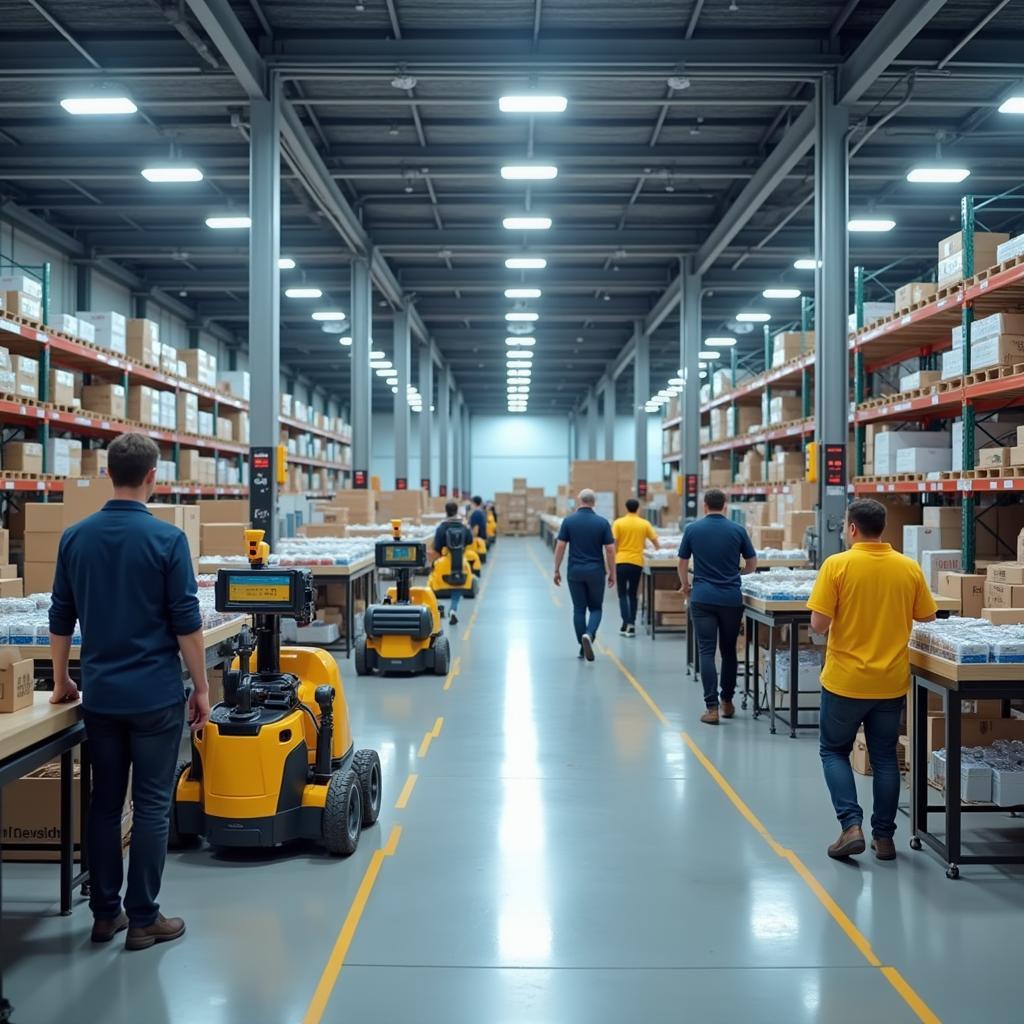Supply chain automation has become an increasingly common topic in IELTS Writing Task 2 examinations, particularly in questions about technological advancement and its impact on employment. Based on analysis of past tests and current trends, this theme has appeared in various forms, especially in 2022-2023, suggesting high probability of similar questions in future tests.
The influence of technological innovation on business practices has been a recurring theme in recent IELTS examinations, particularly concerning supply chain automation.
Task Analysis
Some people believe that the increasing automation of supply chain management will lead to significant job losses, while others think it will create new employment opportunities. Discuss both views and give your opinion.
Key Requirements:
- Discuss both positive and negative impacts of supply chain automation on employment
- Present balanced arguments
- Include personal opinion
- Provide relevant examples

Sample Essay 1 (Band 8.5)
The automation revolution in supply chain management has sparked intense debate about its implications for employment. While some argue that this technological shift will eliminate jobs, others contend that it will generate new employment opportunities. In my opinion, while automation will inevitably displace some traditional roles, it will ultimately create more sophisticated positions and enhance overall economic productivity.
Those concerned about job losses present valid arguments. Warehouse operations, inventory management, and basic logistics coordination – traditionally labor-intensive tasks – are increasingly being performed by automated systems. For instance, Amazon’s automated warehouses now employ robots for picking and packing, reducing the need for human workers in these roles. Similarly, automated inventory management systems have diminished the demand for traditional stock controllers.
However, proponents of automation highlight its potential for job creation. The implementation and maintenance of automated systems require skilled technicians, software developers, and automation specialists. Moreover, new roles are emerging in data analytics, system optimization, and human-machine interaction management. For example, companies like DHL have created positions for “automation coordinators” who oversee the integration of automated systems with human workflows.
impact of automation on transportation jobs presents both challenges and opportunities, as seen in the logistics sector where new roles are emerging alongside traditional positions.
In my assessment, while the transition may be challenging for some workers, automation will ultimately benefit employment markets. The key lies in workforce adaptation and retraining. Companies and governments must invest in education and skill development programs to prepare workers for the evolving job landscape. This transformation mirrors historical technological revolutions, where initial job displacement was followed by the creation of more sophisticated and rewarding positions.
In conclusion, although automation in supply chain management will eliminate certain jobs, it will simultaneously create new opportunities requiring higher skills and offering better compensation. The focus should be on preparing the workforce for this transition rather than resisting technological progress.
Sample Essay 2 (Band 6.5)
Nowadays, automation in supply chain management is becoming more common. Some people think it will cause many people to lose their jobs, but others believe it will make new jobs. I will discuss both sides and give my opinion.
On one side, automation can take away jobs from people. Many workers in warehouses and factories might lose their jobs because robots and computers can do their work. For example, in many big companies, machines now do the work of moving boxes and checking inventory, which people used to do. This is bad for workers who don’t have other skills.
However, automation also makes new types of jobs. Companies need people who can fix the machines and write computer programs. Also, they need workers who can manage the automated systems and solve problems when they happen. Some workers can learn new skills and get better jobs with automation.
I think automation has both good and bad effects on jobs. While some people will lose their old jobs, they can learn new skills to get different jobs. Companies should help their workers learn these new skills. The government should also make training programs to help people.
In conclusion, although automation in supply chains will change many jobs, it’s not completely bad. The most important thing is to help workers learn new skills for the future. This way, people can still work even when there is more automation.
Analysis of Band Scores
Band 8.5 Essay Analysis:
- Sophisticated vocabulary and complex structures
- Clear, coherent organization
- Well-developed arguments with specific examples
- Effective use of topic-specific terminology
- Strong conclusion with clear position
Band 6.5 Essay Analysis:
- Basic but clear vocabulary
- Simple but accurate sentence structures
- Limited range of complex expressions
- Basic examples provided
- Adequate organization but less sophisticated
Key Vocabulary
- Supply chain management (n) /səˈplaɪ tʃeɪn ˈmænɪdʒmənt/ – The management of flow of goods and services
- Automation (n) /ˌɔːtəˈmeɪʃn/ – The use of machines and computers to do work
- Displacement (n) /dɪsˈpleɪsmənt/ – The act of moving something from its usual position
- Integration (n) /ˌɪntɪˈɡreɪʃn/ – The process of combining things
- Workforce adaptation (n) /ˈwɜːkfɔːs ædæpˈteɪʃn/ – The process of workers adjusting to new conditions
For practice, try writing your own essay on this topic and share it in the comments section for feedback. Similar topics might include automation in retail, healthcare automation, or artificial intelligence in education.